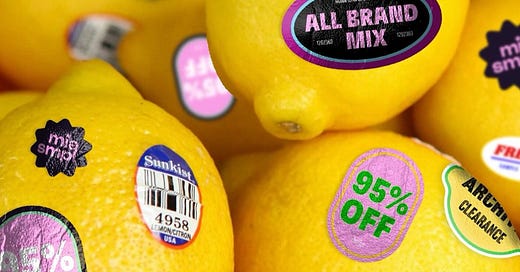MINI BIZ CASE: The new generation of discount retailers.
The 2024 equivalents of Costco, TJMaxx and Marshall's already exist-- and they're crushing.
I noticed a strange phenomenon lately, and perhaps it’s not a phenomenon at all, more just something that’s… happening now.
How many of you still go to TJ Maxx or Marshall’s regularly?
As a New Yorker, I find myself going to these stores… never. I’m more likely to wait in line to go to 260 Sample Sale, but the love of a good deal certainly persists.
Many of my friends here in Brooklyn have Costco cards that they wield on Long Island or in Connecticut, shop 260 Sample Sale on the reg, and are feral for good deals. Why wouldn’t they be? Living anywhere, especially NYC right now, can feel positively psychotically expensive.
But TJ Maxx and Marshall’s can seem a little stuck in the past in the age of Amazon. I like that, for what it’s worth— cultivating a sense of discovery of an in-person store— though the industry itself, if you haven’t noticed, has gone through a quiet transformation in the last few years.
The new era of discount retailer is…
Digitally native
Made for Gen Z and millennials
More brand focused than “deal” focused— though deals are still at the crux, since these retailers aren’t household name retailers like a TJ Maxx, they hook you by advertising deals on brands you already know and love (and can’t typically score 50% off of elsewhere)
Liquidating the same inventory that retailers are selling on their sites— no more exclusive-to-Nordstrom-Rack product lines
Using short term sales or windows to drive urgency and interest in the discounts/brands they onboard in a world where consumer attention span is typically already at a zero
Who are the players?
If you think about it, this business model is pretty easy to adopt. I’ve worked with 2+ of the retailers above, and most of them can actually function on a dropship model. I will shout out Martie, who I love working with— they buy inventory up front.
Hell, we even did a version of this when I used to work at Thingtesting, called Thingdrop. We’d “drop” about 100 units of super-discounted product from cult-favorite brands (Vacation, Graza, Jolie, Nori, Hanni, Wooden Spoon Herbs, and many, many, many more) at 10 am EST every Friday. Brands would actually pay us thousands of dollars for the opportunity to mark down their products 50% or more for an “elite” group of potential customers who would in turn leave reviews on Thingtesting’s website. (Don’t try to replicate this model on your own, it’s not gonna work for you!) Getting brands on board was my job— well, part of it— there for a long time. The program is sadly discontinued, but it was beloved by brands and customers alike! People love deals…
Why do brands even go along with this?
My example about Thingdrop aside, simply put, they need cash. If you’re not in a position to take on debt or venture capital, or you already have too much of either, the fastest way to free up cash is to liquidate inventory. If you have old product sitting around, and you’re paying to store that old product in your warehouse, it makes sense to take a haircut on the retail price to just get it out the door and free up some cash.
Having placed orders from 260 Sample Sale Online, Offe Market and Miami Sample Sale, what I can tell you is:
The retailer rarely even touches the inventory— they are essentially just marketing a deal or a discount to their audience, taking a margin, and leaving the fulfillment to the brand. (This is called dropshipping.)
In the case of Miami Sample Sale, inventory is sent from the brand to MSS’s warehouse, then shipped a second time to the customer. I find this process asinine, I ordered a pair of sunglasses in July that have still not even arrived at MSS’s warehouse, and they won’t let me cancel. I’m told they will be shipping soon so I can wear them in… October.
Food for thought: this isn’t inherently bad— though I found it annoying— but it makes me think about “deal” based shopping in an entirely different way. Do you still want the thing if you have to wait 3 months for it? Or does that thought alone make you not want to buy it? To be honest, I already almost didn’t order the sunglasses, so when I realized they wouldn’t be with me until Fall/Winter, I regretted it even more. I have a lot of respect for shopper with patience, who will take the time to tailor or alter something, custom or special order it, etc— thinking with a forever mentality instead of a “right now” mentality. I have a lot to learn from these folks!
On a business level though, deal based shopping really is about immediate gratification and emotion— the rush of the “score.” I think this fulfillment model will likely not lead to a high returning customer rate for Miami Sample Sale, though I’m obviously biased. That said, I can’t be the only person who wasn’t thrilled to find out they’d be waiting months only after they made a non-refundable purchase…
If you wanted to compete in this game, I think this would be an interesting model to adopt, and not very cost intensive. It’s bootstrappable for sure.



